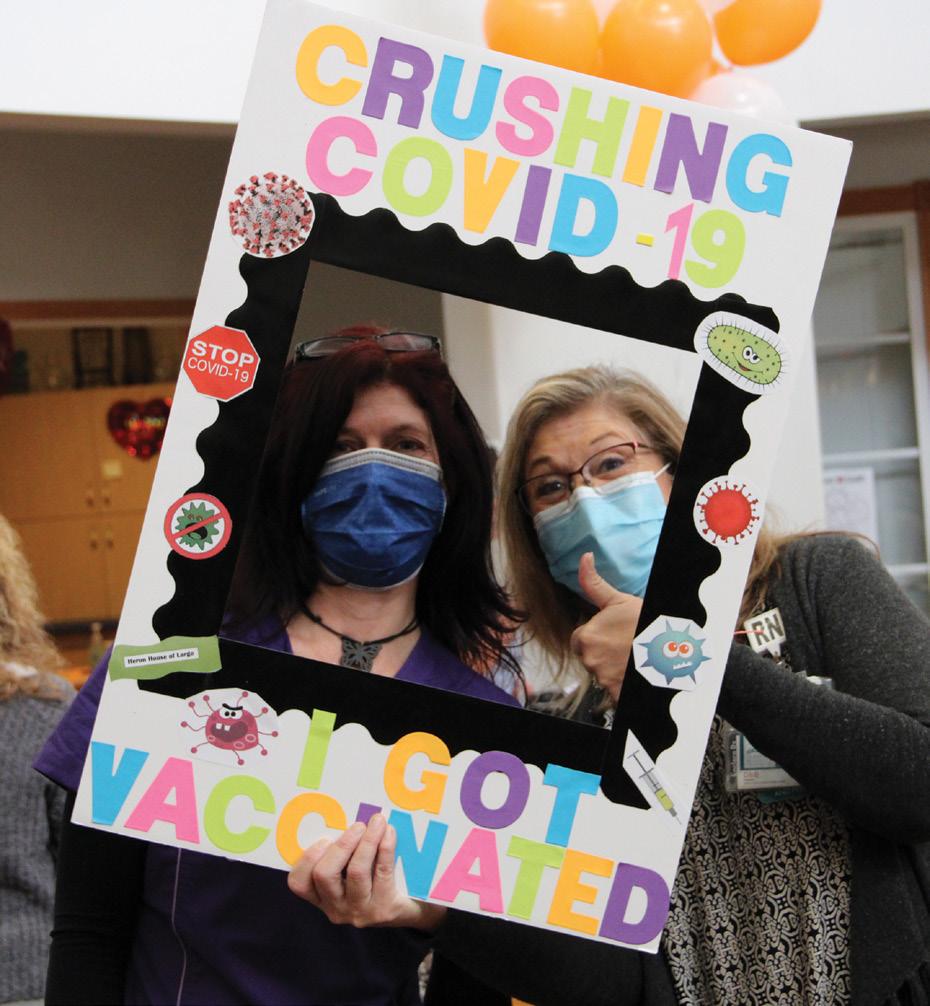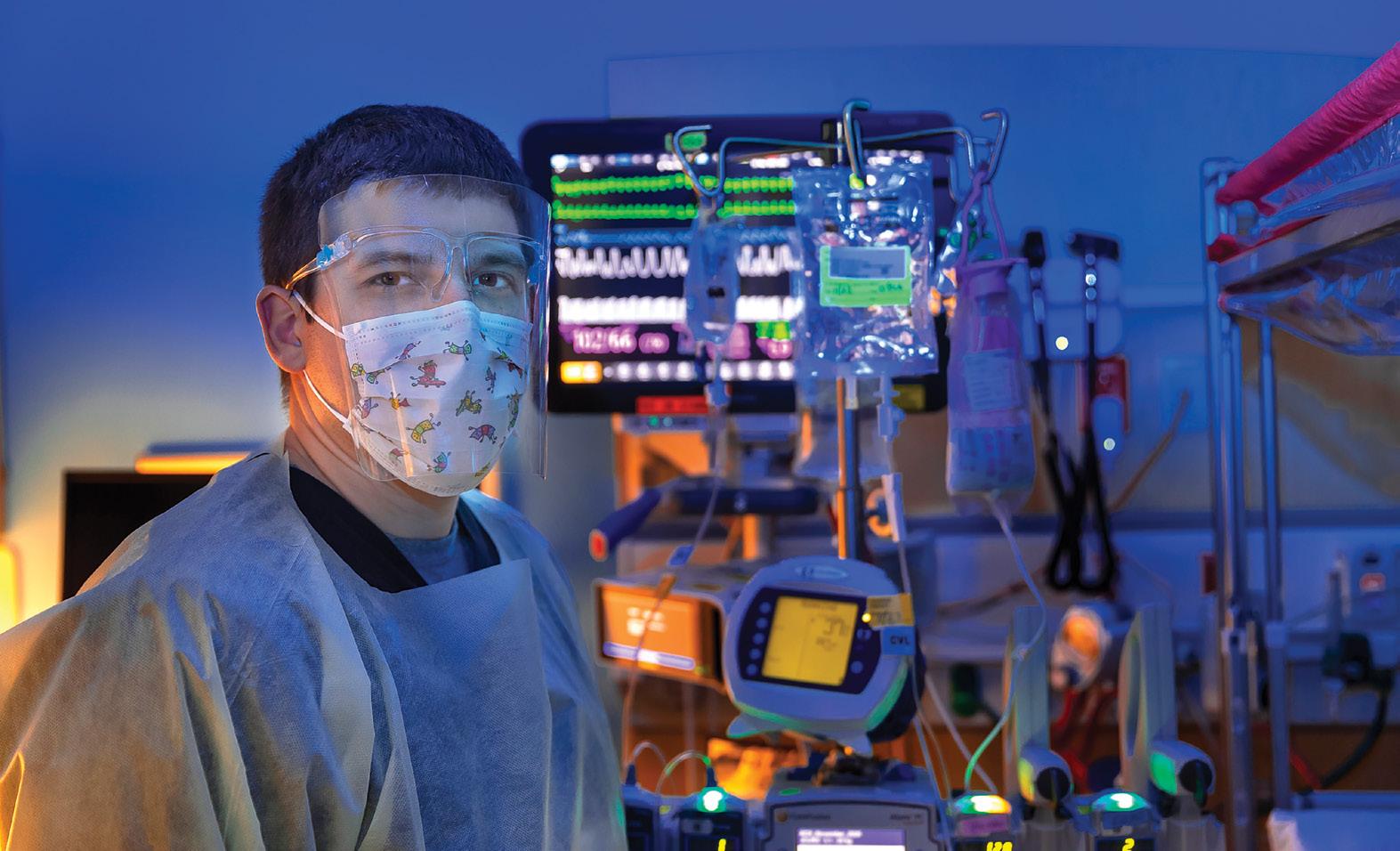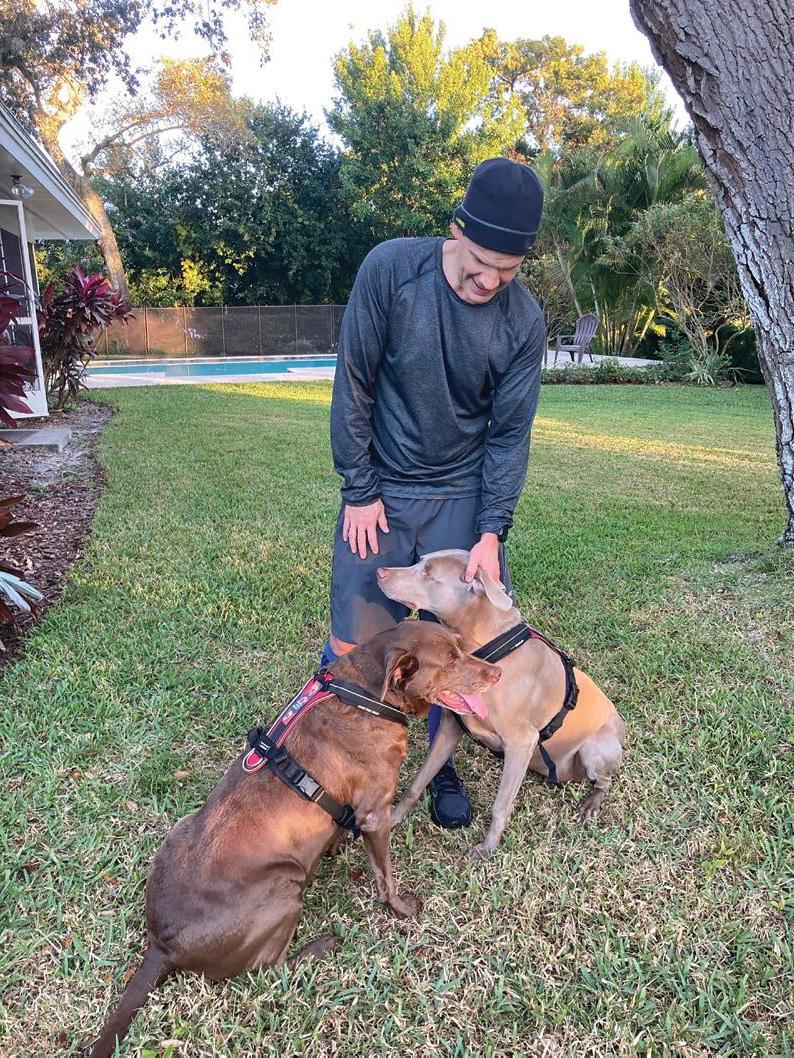
13 minute read
One Year Later: What I Learned
You all make us proud to live in St. Pete. You all make us St. Pete Strong.
It’s been one year since the COVID-19 virus took over the country like an unexpected terrorist. Despite the fear and confusion, the anguish and sorrow, we have witnessed great acts of kindness and generosity and learned lessons along the way. We asked local healthcare and community workers to look back at the last year and tell us what they have learned about themselves or others. The responses we received are heart-warming reminders that at our very core, family and personal connections are what pull us through in troubling times. — Marcia Biggs, SPL Editor
Advertisement
Meghan Martin, MD Johns Hopkins All Children’s Hospital

Meghan Martin and her children. Left to right Avery (9), McKenzie (11), Finley (3), Riley (5).
I feel like I’ve been busy my whole life. I started my family in medical school, and now as an attending physician, I have four kids. All of them have activities and we were constantly on the move between tennis practices, piano lessons, gymnastics, etc. I felt like that one night of the week we could relax was golden, if I didn’t have to work.
When the COVID-19 pandemic struck, and all of these activities were cancelled, I initially found myself paralyzed. I almost felt guilty being still for a moment. There must have been something to accomplish. Then it hit me. I have rarely been truly present with my family.
There has always been something to prepare for. Sure, we’ve had quiet evenings, but our lives are so fast paced, and activity driven. COVID-19 forced us to slow down and while initially it was almost uncomfortable to be slow, now I have really started to engage more with my kids. We play with Play-Doh in the morning and we play in the backyard after school. Messy ice cream sundaes after dinner.
It’s amazing what I would have missed if I wasn’t forced to slow down.
Deb Imbach, RN, MS, CHPCA Director of Clinical Operations, Seasons Hospice & Palliative Care

Deb Imbach, right, at a vaccination clinic sponsored by Heron House in Pinellas County with Bethany Duquette, Seasons Hospice Clinical Liaison.
We cannot trust this virus, it is something that we can’t see and it is taking people down. The virus does not discriminate. Friends have tested positive, some sick, some not. Quarantine becomes a way of life.
My 46-year-old nephew Tyson in Pennsylvania fell ill with COVID-19. He was hospitalized and we thought he was dying. We began having fi nal conversations, or so we thought. Hopelessness. But he pulled through and seven days after he was admitted to the hospital in extremely poor condition, he was allowed to go home to his family.
My personal experience of a loved one who almost died from COVID has taught me that I continue to practice caution, I protect myself and others, I wear my mask, I received my vaccination and I advocate for access to vaccinate the community.
I know that COVID does not discriminate, it sickens healthy people, it threatens everyone. What was once important is no longer. Seeing a friend face to face, holding a socially distanced meeting in person, and fellowship with others is essential. Connections and protections are what is important. Keeping our families and friends in our precious circle of protection is priceless.
This virus wants to rob us of what makes us human but it cannot rob us of hope, compassion, and moving forward to protect our community from surges in the disease.
Nathan Jones BSN, RN, EMT-P Johns Hopkins All Children’s Hospital

When COVID hit the U.S. hospital systems, no one knew what to expect. Being a pediatric ICU nurse, I did not see the full effect of COVID-19 as the adult ICU nurses, but I did experience firsthand how COVID affects us all. We couldn’t go out, places were closed and people were dying. It was a fear I think the whole world shared.
I learned more about other people than I did myself during the pandemic. I saw people lose their loved ones, watch their kids deal with multisystem inflammatory syndrome (MIS-C) in the pediatric intensive care unit (PICU), I saw many friends losing their jobs and wondering what are they going to do, and people blatantly deny that the virus is real. I found myself spending more time at home, working on projects, playing with my kids, and finishing my education. That was my way of coping with this pandemic.
The life lesson I learned early on during all this is, the real true essentials in life are closer than you think. I found that all you need is family, happiness and good friends to get you through anything ... including a pandemic.
Eric Keaton, CMO
SPCA Tampa Bay

This COVID-19 experience has challenged many organizations especially non-profits. Our staff has been resilient taking care of the shelter pets and wildlife we see annually. Despite the pandemic our mission and work continued to flourish.
All of us in the animal welfare business learned what we already knew: the unique bond between humans and animals strengthened. At SPCA Tampa Bay we call it Spreading the Humanimality. Our pets are always there for us. They enjoyed having their humans at home while we worked from a makeshift home office. However, some of our staff could not work from home. During the peak of hurricane season SPCA Tampa Bay worked with several regional organizations to transport hundreds of animals to safety. COVID-19 or not we had to accomplish the mission.
Throughout the pandemic our team also showcased their creativity by finding new ways to continue fundraising without the traditional events. In November, our fund drive called “Paw It Forward” reached new audiences and new donors. Sharing our story and how we serve the community brought us closer to the people and the animals we developed relationships with over the years.
The biggest lesson I have learned this past year is our growing need for a connection and to disconnect as well. Working from home was actually longer hours and more time online. We need to connect with each other offl ine, and disconnect from our devices.
Lariana Forsythe, CEO
CASA | End Violence: Stand Up To Silence
For people experiencing domestic violence, the COVID-19 pandemic has mirrored the fear, vulnerability, and uncertainty surrounding their abusive relationship and compounded the trauma and isolation infl icted on them. At CASA, we’re committed to helping those who are not “safer at home” fi nd the peace and safety they deserve. CASA’s 24-hour Emergency Hotline: (727) 895-4912 | TTY: (727) 828-1269
Kayla Cavicchio, BSN, RN, CEN
St. Anthony’s Hospital
Before it began, 2020 was given expectations to be a year of vision, a new decade of hope. Despite the anticipation, 2020 became a perfect storm with the outbreak of COVID-19. Out of the storm were lessons to learn, worldwide and within me personally. Lessons learned about the human spirit are the ones that will stay with me forever.
I became acquainted with the generous people of St. Petersburg. Many selfl ess people dropped off homemade masks. In a time when grocery shelves were lean, people delivered more food than could be imagined. These were people who took time out of their lives and used their resources and talents to take care of us.
I was in awe of how immensely dedicated our emergency room staff was in a time with so many unknowns. Through all the chaos and confusion, our unity to provide care to the community was inspiring. We stood by each other as always when things got tough, relying on one another in ways we never expected. Our actions and resilience gave each other and the community reassurance that we will get through this together which is a lesson worth learning.
Kirsten Berg, RN Cardiovascular Intensive Care Unit
Bayfront Health St. Petersburg
I think we all can agree that everyone has suff ered and struggled in some way during the times of COVID-19. As a registered nurse, I have witnessed fi rst-hand the struggle of those fi ghting for their lives and those coping with unexpected loss, and I have experienced the crushing emotions that have overtaken those dealing with loss. Many others have lost jobs and businesses during this time and their struggle has not gone unnoticed.
During this time, I have managed to realize what is important in my life and that includes the human connections I have made and strengthened as I have witnessed those struggling come together and support each other during hard times. I have also witnessed tremendous love for one another between families, friends and nurses.
No one ever could have expected what was to come of this, but I do feel that this pandemic made most of us realize we are stronger than we could have imagined.
Hope Woodson, Health Center Director
St. Petersburg Free Clinic
To be a healthcare professional at the starting phases of a pandemic, throws you into a cycle that mirrors the states of grief.
Denial: Though keenly aware of the impact of a novel virus, this cannot possibly be happening. I will not panic, it will go away before we have even begun.
Anger: I just started this job, I just moved here. I’m making progress with our clinic, I cannot believe this virus is disrupting my work life, home life, new friendships and any progress I’ve made with my patients.
Bargaining: If we as a society do everything we are told, we will be back sooner than expected. Our doors will open and our patients will return.
Depression: I miss my coworkers, I miss my patients, I miss my family. Our clinic will never return to normal; it is not impossible. Everything we love about our work will change.
Acceptance: As a work team we are getting into a new groove. We have bonded as a staff and we can safely continue to see patients and make a difference.
At various parts of the pandemic, these emotions elevated and dissipated over and over with zero pattern and without prediction. On days of quiet and acceptance it was important that I took time to realize I was not alone in these thoughts. I still had food, shelter and my health. The patients we care for at the St Petersburg Free Clinic Health Center rarely have that trifecta of comfort.
The overall impact of this pandemic was crippling to those we serve. Patients were afraid to leave their homes for care, some lost their income completely and many could not get important prescriptions they needed for maintenance of chronic conditions.
This pandemic has opened my eyes to several things. We can see patients in a non-traditional clinic format. We can adjust our clinical way of operating to meet the needs of patients, as well as keep our staff and clients safe. We matter to our patients; we are their healthcare home.
Often, we get lost in everyday patterns of operations and forget how much we matter to those we serve. My staff and I will not take that for granted when this is all over. We will remember every “thank you for staying open,” “thank you for helping me get my medical supplies,” “thank you for help with my pain,” “thank you for listening.”
Elizabeth Shirley, RN
St. Anthony’s Hospital ICU

There have been a lot of things to learn during our experiences with COVID-19 and I am sure there are still many more to come. I feel my most important lesson was realizing how important our relationships with our patients’ family members are.
When COVID-19 numbers were growing, our hospital quickly restricted visitors to ensure the safety of our team members and patients. After only a few weeks, it was so evident how much we missed them.
To me, family members not only off er a personal insight on patients but also play a role in their healing process. They provide comfort, care and might even notice subtle changes in condition. Additionally, a unit full of ventilated patients without anyone to share their unique stories took something away from what I enjoy about nursing. I was able to get through the day, but I missed stories about their grandkids, their favorite pet or hearing about how they met their spouse.
I have coped by spending more time on the phone with a patient’s family or utilizing our video chat tablets. It was a lesson to me learning how much I value that personal connection that was lost during our lockdown. As a lesson going forward, I am sure to tell my visitors how important they are to me, my team and their loved one.
Megan Patterson, RN Neuro Progressive Care Unit
Bayfront Health St. Petersburg
Looking back over the last year, I can safely say that the COVID-19 pandemic came with several life lessons: fear, mental health, and the value of healthcare workers. Volunteering for the COVID-19 unit, I realized I wasn’t afraid when I was at work; I was doing what I was trained to do. Fear of the unknown is what weighed heavily on my shoulders. As time progressed, medications and interventions supporting better patient outcomes were discovered and fear of the unknown wasn’t as heavy.
To take care of me, I needed to fi nd a mental escape, I needed something that would consume my mind when I wasn’t at work.
I enrolled in a BSN program and that helped me focus on something other than the pandemic.
The 8 pm cheers coming from downtown residents in St. Petersburg were emotional. I’m grateful for a supportive community. I think it’s important for others to realize that during the pandemic, healthcare workers weren’t doing their jobs diff erently. I’m passionate about caring for sick people. I’ve done this pre-pandemic, during pandemic, and will continue to do it post-pandemic.
If I am a hero now, I hope people realize that I was a hero before and will be a hero after.
Brittany Hamilton, RN, BSN, CCRN Manager, Quality Process Improvement and Patient Safety Quality Assurance
Bayfront Health St. Petersburg

Personally and professionally, COVID-19 has been a roller coaster of emotions for me. As a nurse, I have seen the fear and panic of my peers facing the difficulties of working the frontlines during a pandemic. Over the last year, I have watched my colleagues and friends fall ill and fight for their health. I have worried for my family’s safety, while longing for the company of friends.
Despite these troubled times, I have experienced feelings of joy and pride. I have cherished the extra time with family and enjoyed different adventures, like car parades! I am proud of my healthcare colleagues. They continuously strive to push forward, coming together to provide a sense of hope for the community.
I have valued learning from my peers as we began operations for vaccination clinics within the facility. We have cried tears of joy with patients who were able to receive their COVID vaccine. This year has provided me with many new abilities from creating online meetings to common core second-grade math.
But most importantly, it has taught me to never take life for granted and find appreciation in the small moments.





